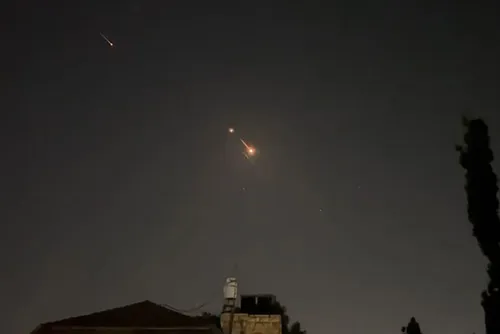
Iran’s military action against Israel this weekend in retaliation for the destruction of its consulate in Damascus, Syria, has raised tension in the Middle East and worries international authorities. On Saturday, the launch of more than 300 drones and missiles into Israeli territory caused several explosions. Some drones were shot down by the Israel Defense Forces, the United States, the United Kingdom and Jordan before reaching Israeli airspace.
The attack was an Iranian response after Israel destroyed the Iranian consulate in the city of Damascus on April 1. A meeting of the UN Security Council took place this Sunday at the request of Israel, which intends to launch a counterattack.
The countries exchanged accusations and demanded sanctions against each other during the United Nations meeting, which ended without any agreement. United States President Joe Biden made it clear to Israeli Prime Minister Benjamin Netanyahu that the North American country will not support a possible counteroffensive. To comment on the subject, the program Central Brazil this Monday (15/04) spoke with Reginaldo Nasser, professor of International Relations at the Pontifical Catholic University of São Paulo (PUC-SP).
Iran’s attack was a big surprise for the entire world, Nasser said. “It is not like Iran to do this and it was already known that it was a trap by Israel. Israel, as was shown, attacked the Iranian embassy. The embassy is a sacred place. It attacked killing several people, but after this initial impression that the conflict would escalate, behind-the-scenes information emerged that Iran had previously informed Turkey, which passed it on to the United States, which passed it on to Israel, that the attack would be a ‘controlled’ one.”
Faced with this, “Israel’s cabinet is divided”, says Nasser. “Those members more on the right want to go on the attack, but it seems that Joe Biden had a conversation on the phone with Netanyahu and advised him against doing that and stated that the United States will put all its forces to help Israel defend itself, but not to attack.”
He highlights that Jordan immediately came out in favor of Israel, including intercepting missiles from Iran, unlike Saudi Arabia and Egypt, which indicates less support from Arab countries for Israel. “Until October 7th, when the Hamas attack occurred, the United States and Israel were making every effort to bring Saudi Arabia into that great agreement, which is called the Abraham Accord, made by Trump who articulated all these Arab countries with Israel. Saudi Arabia left despite having a good relationship with the United States and the other very important fact was the detente between Saudi Arabia and Iran. So the two biggest enemies in the region entered into an agreement sponsored by China easing their tensions. “
According to the professor, the note from Saudi Arabia, the United Arab Emirates and the Gulf monarchies brings calm to the situation. “Egypt is also very fearful at the moment, avoiding commitment, so Israel today does not have the support it would have at other times from these Arab allies who are on the side of the United States and were also occasionally in tension with Iran. On a In general, conflicts between states in the Middle East, with the exception of Israel, have lowered their level of tension.”
The full interview, carried out by presenter Luana Ibelli, is available in this Monday’s edition (15) of Central Brazilwhich is available on the channel Brazil in fact no YouTube.
And there’s more!
US elections
In the US, there is no limit to the amount of money that can be donated to election campaigns, nor is there a limit to how much candidates can spend.
Editing: Matheus Alves de Almeida

Source: www.brasildefato.com.br

